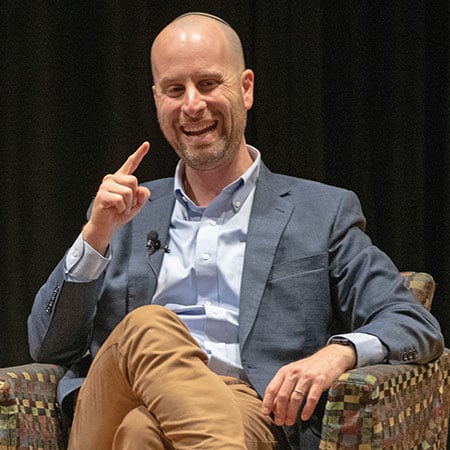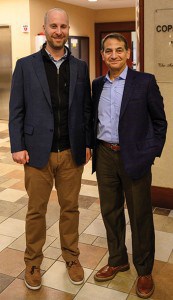Yaakov Katz, editor-In-chief of the Jerusalem Post, educated and enlightened our community as part of the 2019–2020 Israel Today series. Katz is author of Shadow Strike: Inside Israel’s Secret Mission to Eliminate Syrian Nuclear Power. He shared his message over several days throughout the community including with the U.S. Naval Warfare Development, Cape Henry Collegiate Nexus Global Scholars Program, an interview with CBN News, an appearance on CBN’s The 700 Club, and with the Global Studies and World Language Academy at Tallwood High School. Katz concluded his visit with an evening interview with me at the Sandler Family Campus. The event was sponsored by the Community Relations Council of the United Jewish Federation of Tidewater, Simon Family JCC, and community partners’ Israel Today series, as part of the Lee & Bernard Jaffe Family Jewish Book Festival, in coordination with the Jewish Book Council.
At the Sandler Family Campus, Katz spoke to a full house, reflecting the community’s sharp interest in such an important and interesting topic. It was insightful to hear from the author, an incredible story-teller, how the events of the September 2007 strike on the almost active, Syrian nuclear facility unfolded. It is one thing to retell a story from reports and reviews, and another to have personally interviewed the main characters that determined the course of the eventual attack and therefore world events. Katz gained access to figures such as Vice President Dick Cheney and Prime Minister Ehud Olmert, the Mossad, the IDF aviators that flew the mission, and the IDF military staff that planned the mission—providing nuggets of inside information and intricate shades of decision-making not readily available.
Katz explained that Israel had a red line on weapons of mass destruction in the hands of its enemies. The decision, therefore, was made to destroy the facility, but to first let the United States have the opportunity to do so. In 2007 in Israel, he noted, “…it was after a bad war (Lebanon 2006).” It was pre-civil war Syria, and Syria had a larger and formidable army, that Israel did not want to antagonize and risk going to war against. “If America were to attack and carry out the operation, the chance of retaliation against Israel while still possible, would dramatically drop.” If America did it, Katz said, it would be another ball game, and would deter Iran, and maybe even Korea from going forward with nuclear development.
In September of 2007, however, President George W. Bush was ordering a surge of troops to Iraq, and refused to do more in the Middle East. Bush told Israel he wouldn’t interfere and would keep the operation classified. Prime Minister Olmert launched the strike, a complete success, and then made the remarkable decision to say nothing to Israel or the world. This unbelievable strategy depended on the guess that Assad told very few people in his government about the nuclear plant, and that he might lose his grip and power and therefore also not say anything. As predicted, there was no response from Syria, and the public knew nothing for over a decade.
Katz concluded with the thesis about how serious it could have been if Israel had not taken action. “The area where they were building this reactor, in 2014…was taken over by…ISIS. Think if they had gotten a hold of it and made a dirty bomb or radioactive material.” After a momentary pause to let this sink in, he said, “Israel saved Israel, but Israel saved the world in that sense.”
For the full story, read Shadow Strike and watch the interview on the CRC’s Facebook page, www.facebook.com/CRCUJFT/.
-Herman Shelanski Vice Admiral, Retired
Spearheaded by the Community Relations Council of the United Jewish Federation of Tidewater and Simon Family JCC, Israel Today is a year-long offering of scholarly and cultural events and is made possible through the support of numerous community partners including all area synagogues, Jewish agencies, and organizations. To learn more about upcoming visiting experts, go to jewishva.org/IsraelToday or contact Megan Zuckerman, CRC director, at MZuckerman@ujft.org.


